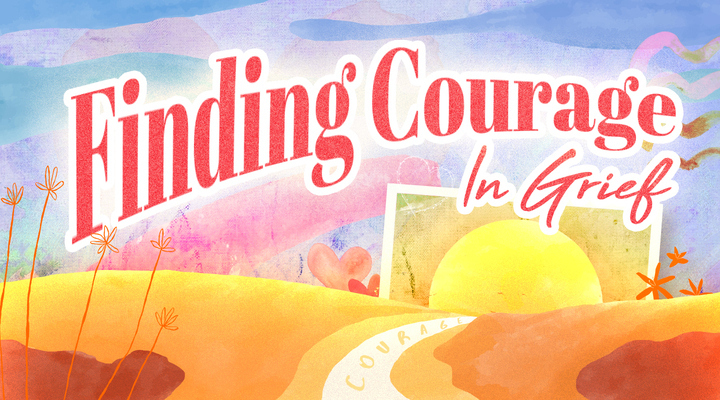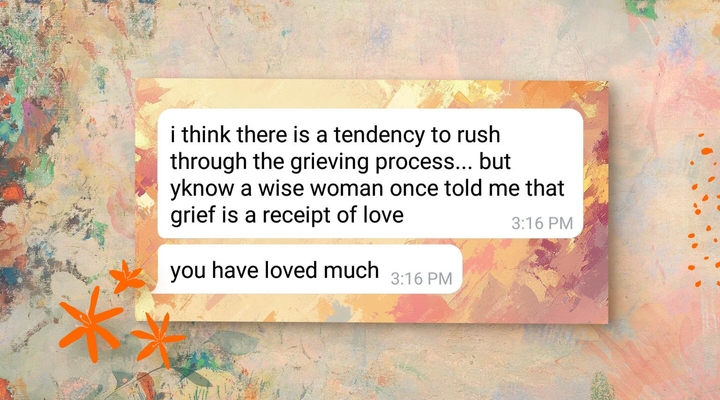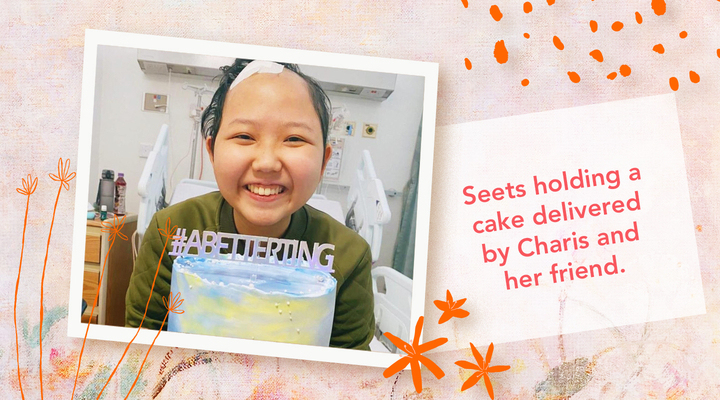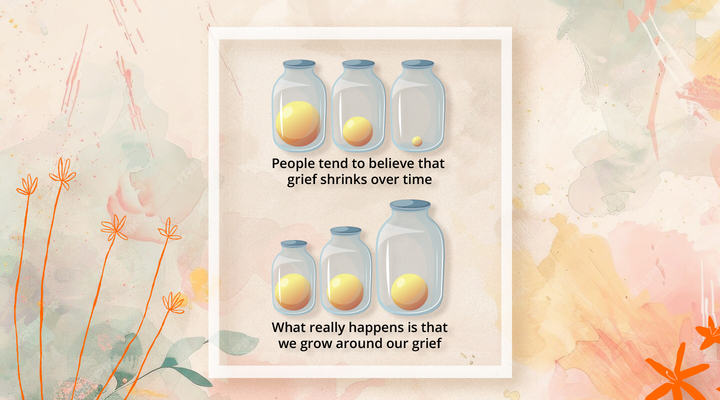Navigating Loss: How Can We Find Courage In Grief?

All of us experience grief, but we cannot be familiar with all expressions of grief.
My friend, Seets, shared this with me one day, the context for which I cannot remember:

This was before she passed on from cancer, and I experienced what I came to recognise as “love across a border”. Looking back, I saw all the borders I had had the privilege of loving Seets across: the borders of unconsciousness, of forgetting, of excruciating chemotherapy. It was as if we had come to the final, boldest border of death itself – and still, I continued to love her from the other side. And that, to me, is the best definition of grief I could find.

I would sum up the journey of grief in four forms of courage to learn.
First, the Courage To Trust the Process.
Daily, I was frustrated. It can be difficult to grapple with the stains of grief on one’s professional life. It felt more acceptable to take my time to work through emotions and do things at a slower pace when I was alone. But when I felt responsible to others, when I wanted to be conscientious – that’s when the pressure comes strongest to move on quickly.
While grieving, I had to unlearn the suspicion that my colleagues were going to suddenly run out of patience for me, the self-inflicted harshness for remaining mired in what I considered to be needless suffering, and the guilt of experiencing something I felt I had no right to experience given that others had been through worse.
But the truth is that loss is complicated and hits people unevenly. There are no short-cuts to walk through it. If not for the compassion of my friends who reminded me that healing has its own timelines which we cannot forcefully expedite, I would have been trapped in a vicious cycle of shame and striving.
It takes courage to trust that the grieving process will run its course. And sometimes, that’s all we can do.
Second, the Courage To Try Something New.
A friend shared this visual with me after she lost her beloved brother, and I found it greatly encouraging.

There are some disciplines you form when you encounter grief, and I think embracing these new habits is an important part of growth.
I’ve tried different methods to cope with my grief. I went for therapy, read up on crying techniques (they exist!), and kept up my regular practice of journaling but with greater intention to pen down what I missed and regretted regarding Seets.
Third, the Courage To Change How We Appear to Others.
Our biggest hindrance to expanding around our grief can be our fear of how others perceive us.
There was a period where I often found myself spontaneously crying, uncontrollably. Sometimes the tears came unannounced during meetings, and I would have to excuse myself. Other times, I felt physically unable to continue with a task. These moments of weakness were hard to accept, and I constantly felt like I was letting my bosses down.
It takes courage to be honest about the help that we need. Granted, I think such vulnerability should be reserved for the ones whom we trust have our best interests at heart.
I was blessed to have supervisors who, without question, took me off intense or time-sensitive pieces of work without writing me off as incompetent or lazy. They had frank discussions with me about my limitations, without judging me for struggling.
Lastly, the Courage To See That Genuine Connection Begins Where Individual Strength Ends.
I marvel that some of my closest friends came from the organisation in which I went through some of my darkest times.
I am not the only one to have benefitted from the generosity of colleagues and bosses in the Public Service. I’ve heard countless heartwarming stories of bosses encouraging their staff to take time off, colleagues going out of their way to deliver gifts, teams attending wakes together, and so on. Sometimes, these connections can only occur when we choose to receive them.
That said, I think the journey of loss is inherently lonely. There are no easy answers for how we should concretely respond to colleagues experiencing the pain of loss, but the simplest, most basic rule of thumb I can point to is to love them.
Love does not always necessitate action or closeness – but sincere gestures and friendships are likely to have more impact. To love someone is to be consistent in offering a safe space for them to feel what they need to feel.
Love does not insist for them to open up straightaway, or to be coherent all the time. It stays hopeful that someone will emerge stronger from a tunnel, even if that tunnel seems endless.
It persists after someone rotates to another Ministry, and in spite of the fact that they might forget all the sacrifices that were made to support them. I think that love, no matter how unnoticed, and even in the briefest of moments, is what goes the distance.
This article was written and contributed by a public officer.
Are you a public officer with an inspiring story to share? Write to the Challenge team at psd_challenge@psd.gov.sg
- POSTED ON
Aug 22, 2024
- TEXT BY
Charis Tan









